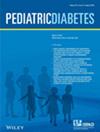大量儿童糖尿病酮症酸中毒的急诊科报告
IF 3.9
3区 医学
Q2 ENDOCRINOLOGY & METABOLISM
引用次数: 0
摘要
背景。糖尿病酮症酸中毒(DKA)是儿童糖尿病的潜在威胁生命的并发症。然而,人口因素对呈现的影响并不明确。方法。我们纳入了来自12个中心的18岁DKA(葡萄糖)患儿。300 mg/dL,血清pH和lt;7.25,或血清碳酸氢盐15 mEq/L),纳入儿科急诊应用研究网络(PECARN)的DKA(液体)试验研究中的液体疗法。还收集了在登记期间到中心就诊但因疾病或治疗相关原因未登记的儿童的数据。我们比较了新诊断和以前诊断为糖尿病的儿童以及不同年龄组儿童的人口学、临床和生化结果。结果。在1553名儿童的1679次DKA发作中,799次(47.5%)发生在新诊断的糖尿病患儿中,396次(23.6%)为重度(pH <7.1)。新诊断的6岁儿童在pH值方面不太可能有严重的DKA,但有更严重的低碳血症和更高的血尿素氮水平,这些因素先前与脑损伤风险相关。较低的社会经济地位(SES)(基于家庭收入和母亲教育水平)与新发病儿童中更严重的DKA和以前诊断的儿童中复发性DKA相关。结论。需要更大的努力来早期识别患有糖尿病的儿童,并防止复发性DKA,特别是在低社会经济地位群体的儿童中。由于脑损伤的风险较高,患有DKA的幼儿可能需要更密切的监测。本文章由计算机程序翻译,如有差异,请以英文原文为准。
Emergency Department Presentations of Diabetic Ketoacidosis in a Large Cohort of Children
Background. Diabetic ketoacidosis (DKA) is a potentially life-threatening complication of childhood diabetes. However, the influence of demographic factors on presentation are not well-defined. Methods. We included children from 12 centers who were <18 years with DKA (glucose > 300 mg/dL, serum pH < 7.25, or serum bicarbonate <15 mEq/L) enrolled in the Pediatric Emergency Care Applied Research Network (PECARN) Fluid Therapies Under Investigation in DKA (FLUID) Trial. Data were also collected for children who presented to the centers during the enrollment period but were not enrolled due to disease or treatment-related reasons. We compared demographic, clinical, and biochemical findings among children with newly and previously diagnosed diabetes and children in different age groups. Results. Of the 1,679 DKA episodes in 1,553 children, 799 (47.5%) episodes occurred in children with newly diagnosed diabetes and 396 (23.6%) were severe (pH < 7.1). Newly diagnosed children <6 years of age were not more likely to have severe DKA in terms of pH, but had more severe hypocarbia and higher blood urea nitrogen levels, factors previously associated with the risk of cerebral injury. Lower socioeconomic status (SES) (based on family income and maternal education level) were associated with more severe DKA in new onset children, and recurrent DKA in the previously diagnosed children. Conclusions. Greater efforts are needed to identify the children with diabetes early and to prevent recurrent DKA, particularly among children in low-SES groups. Young children with DKA may need more intensive monitoring due to higher risk of cerebral injury.
求助全文
通过发布文献求助,成功后即可免费获取论文全文。
去求助
来源期刊

Pediatric Diabetes
医学-内分泌学与代谢
CiteScore
6.60
自引率
14.70%
发文量
141
审稿时长
4-8 weeks
期刊介绍:
Pediatric Diabetes is a bi-monthly journal devoted to disseminating new knowledge relating to the epidemiology, etiology, pathogenesis, management, complications and prevention of diabetes in childhood and adolescence. The aim of the journal is to become the leading vehicle for international dissemination of research and practice relating to diabetes in youth. Papers are considered for publication based on the rigor of scientific approach, novelty, and importance for understanding mechanisms involved in the epidemiology and etiology of this disease, especially its molecular, biochemical and physiological aspects. Work relating to the clinical presentation, course, management and outcome of diabetes, including its physical and emotional sequelae, is considered. In vitro studies using animal or human tissues, whole animal and clinical studies in humans are also considered. The journal reviews full-length papers, preliminary communications with important new information, clinical reports, and reviews of major topics. Invited editorials, commentaries, and perspectives are a regular feature. The editors, based in the USA, Europe, and Australasia, maintain regular communications to assure rapid turnaround time of submitted manuscripts.
 求助内容:
求助内容: 应助结果提醒方式:
应助结果提醒方式:


